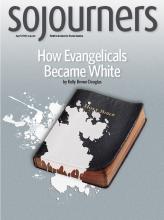PURPLE IS THE liturgical color for Lent. “Purple” is also the political identity of America’s houses of worship. We are a mixture of Republicans, Democrats, and independents who come together for worship, fellowship, and service. No political party owns religious truth.
In 2017, some in Washington, D.C., made a concerted effort to undermine churches’ congregational political mix through the repeal of the Johnson Amendment, a provision in the tax code since 1954 that protects the independence and integrity of not-for-profit organizations by prohibiting them from endorsing or opposing candidates for public office.
The Johnson Amendment does not specifically target churches; it applies equally to all 501(c)(3) organizations, religious and secular. Under the current tax code, churches are assumed to be 501(c)(3) organizations (c3s) but can opt for another tax-exempt status. Most churches remain c3s because in addition to being tax exempt, congregants’ tithes and offerings are tax deductible. Despite some hysterical claims, churches and charitable organizations can address any issue—no matter how controversial or unpopular—under the current tax code. The line is drawn, however, at c3 organizations telling people who to vote for or against.
During the fall debate on the largest change to the U.S. tax code in 30 years, the House version of the tax bill would have effectively repealed the Johnson Amendment. The Senate version never included such language, nor did the final version of the bill that became law.
We might have seen the end of this longstanding tax provision if not for the outcry from nonprofits, foundations, and people of faith. Can you imagine? Candidate commercials played during worship services. Candidate flyers included in every bag of food given out by the local food pantry.
Read the Full Article

